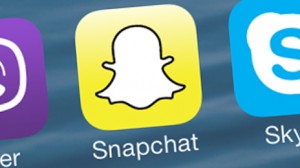 Evan Spiegel, the founder of Snapchat, the wildly popular cell phone app explains that this idea of “ephemeral media” (social interactions that did not leave a trace online) is very powerful, and so it has proved.
Evan Spiegel, the founder of Snapchat, the wildly popular cell phone app explains that this idea of “ephemeral media” (social interactions that did not leave a trace online) is very powerful, and so it has proved.
Early in 2012, teenagers, the prime target segment, became accustomed to the new concept of communicating through sending pictures.
With the growing popularity, the assumption that this app poses a major threat to Facebook occurred, which could be vaguely backed up by the fact that Facebook’s chief financial officer revealed that young teenagers were spending less time on his network. Coincidence? Maybe. Likely? Probably not. Also, Spiegel is reported to have rejected a $3bn takeover offer from Facebook.
So how does Snapchat plan to make money? The expected response based on Snapchat being a free app without advertisements, is that the firm’s right now is focused on building and audience and larger consumer base rather than worrying about revenues. However, building revenues is the priority already, and the aim is to earn money from users rather than advertisers.
Though, this seems like an unlikely proposition considering the competitors Facebook and Twitter have relied almost completely on forms of advertisement such as revenue sources. Therefore, it is unclear that users who have already got accustomed to a free service can be persuaded to pay for it. However, Spiegel supports his plan with the success of WeChat, owned by Tencent.
I know I won’t by paying, but maybe others will! We’ll have to see.
“Chatting With Mr Snapchat.” BBC News. BBC, 14 Nov. 2013. Web. 16 Nov. 2013. <http://www.bbc.co.uk/news/technology-24925932>.
What is WeChat:
“WeChat – The New Way to Connect.” WeChat – The New Way to Connect. N.p., n.d. Web. 16 Nov. 2013. <http://www.wechat.com/en/>.
